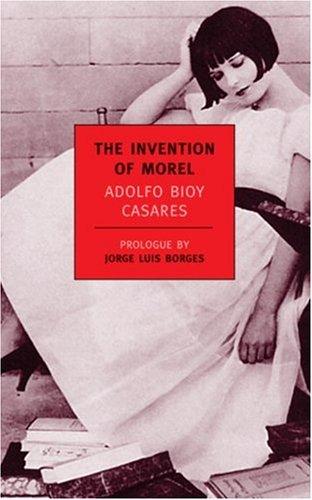Dr. Goat reviewed The invention of Morel by Adolfo Bioy Casares (New York Review Books classics)
Mortal Projections
5 stars
Content warning Beware of Spoilers! This review is meant for others who have read the book already :)
In a way, this is a story of the idealization of love and life––of courtship even. The fugitive (protagonist) obsesses over Faustine, whom he can never have, and so he eventually adds himself into the projections alongside her. The record is forged to display their false love affair, and ultimately it represents a sad testimony of his unrequited love.
It seems that the "invention" could refer to not only the actual invention of Morel––that is, the contraption that records himself and his guests––but also the possibility that the fugitive invented him; that he hallucinated the whole thing (perhaps as a result of the island's strange disease) or that he is just making it all up. He was a writer after all. The question is why "invent" Morel, if that is a possible interpretation? Perhaps he is literally projecting. Perhaps Morel's unforgivable damning of all his friends is a retelling of the fugitive's own (undisclosed) crimes? Or perhaps it's meant to make his crime seem less severe.
His obsession with Faustine is interesting, because he has almost no reason to care so much about her. Perhaps she represents someone he loved and killed. At one point, when he first discovers her interacting with Morel and humiliates himself with a stupid joke, he comments that he is so sick of them and that maybe he would kill her. Toward the end he comments that she is deserving of Morel's apparent obsession with her, even if it resulted in her death. Morel's act was "sublime" in the fugitive's eyes. He seems to come around to agreeing with Morel at the end (or his own misdeeds) and he attempts to redeem himself by inserting himself into the recordings. In this way, if Morel is his own invention, he is re-inventing himself and the circumstances. If that is a viable interpretation, then his story is a pitiful one of trying to cope with having killed someone by doing something to kill life itself. He damns himself to running from the law, to living a life bereft of meaning. Even if he didn't invent Morel and the whole story, he "invents" reasons for his actions apparently motivated by a mortal desire for meaning––especially meaningful relationships.
It is certainly a story of despair. It seems to comment on the brutal irony of life and love––their being so fragile, yet so powerful that they can break someone down completely. Morel killed his friends because he loved them and wanted to preserve them. (Relating to my theory that Morel is the fugitive's projection, he does comment at some point that perhaps Morel did all of this because he was hiding a secret, and that the whole production would make his friends forget it.) He desired them so much that he was willing to kill them off so that the object of his desire could be immortal. In that sense, he is in pursuit of the ideal––not the people themselves or the relationships, but the ideas of them, the fact of their existence. I like this metaphor, because it is something I have thought about a lot. The book paints an interesting portrait of us as a species in that light. Perhaps it is a desire to possess or control, or just to be certain or safe. Perhaps we can call it vanity. "There is nothing new under the sun," yet Morel invents immortality. What a brilliant metaphor for vanity!

